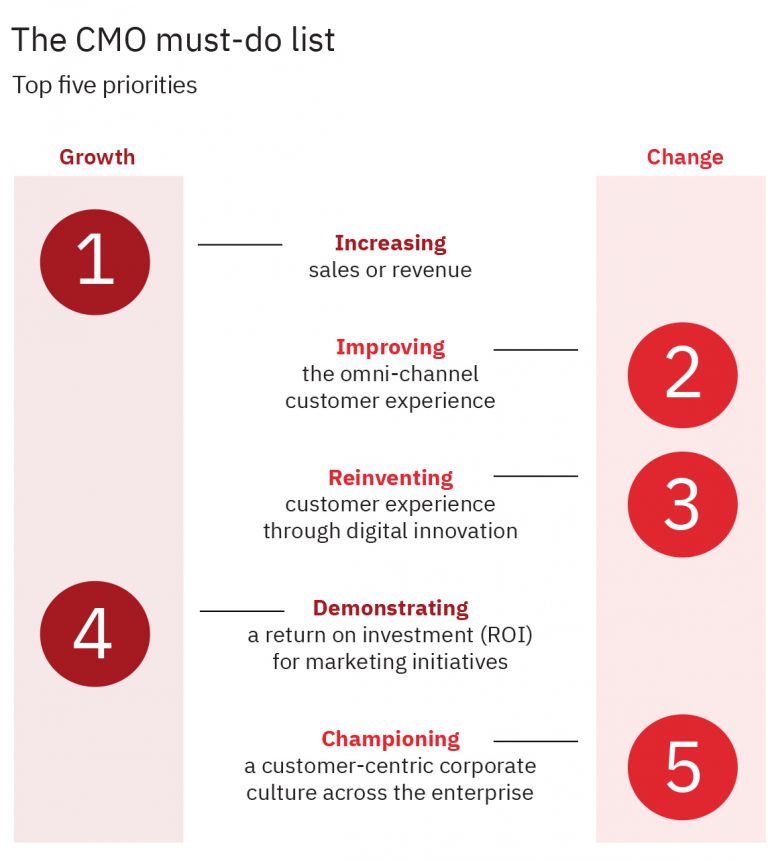If ever there was a time for Chief Marketing Officers (CMOs) to take center stage, it’s now.
According to the new Global C-suite Study from the IBM Institute for Business Value, market factors surpassed technology as the most important external force impacting C-level survey respondents’ businesses. As more companies adopt foundational digital technologies, these become less differentiating for brands. Instead, changing market dynamics, evolving customer preferences and new distribution channels are once again the C-suite’s priorities.
To better understand the impact this shifting business environment is having on CMOs, we conducted a deep-dive analysis of the 2,069 CMOs who participated in our C-suite Study, which launched earlier this year. Indeed, in response to these changes, most CMOs (and Chief Executive Officers) anticipate that their organizations will likely shift their focus from products to experiences.
This means the considerations that are top of mind for today’s C-suite are sitting squarely in the CMO’s wheelhouse. As one CMO from a US-based financial services company noted, “The role of the CMO is evolving into ‘Chief Experience Officer.’ We need to own the client experience from beginning to end, across the organization.”
CMOs also predict that businesses will place less emphasis on product innovation and more on business model innovation. These moves could profoundly impact how marketing defines and amplifies brands, how organizations engage customers and how they generate value. This is especially important for organizations that are creating or contributing to platform business models, where brand awareness and trust largely depend on recommendations from the platform community versus traditional communications. Half of CMOs report their organizations are either considering, piloting or adopting a platform business model.
Of all C-suite roles, the CMO is closest to the customer’s needs and desires. More than 70 percent of CMOs report their ability to lead organizational growth and change is now essential to their professional success. This is reflected in the top five priorities that CMOs told us are on their must-do list for the year.

CMOs have had to expand their skill sets beyond core marketing capabilities for some time now. (This was the theme of our first CMO Study in 2011.) As more C-suite leaders recognize that customer experiences define and differentiate their organizations, CMOs must prioritize three key areas:
- Value. As strategic influencers in the C-suite, CMOs should assess market trends and needs, and act on data-driven insights that contribute greater value and measurable results across the enterprise.
- Experience. As customer champions, CMOs should identify their customers’ unmet needs. Using data and technology, they can deliver exceptional, personalized experiences across channels and even ecosystems.
- Culture. As visionaries, CMOs need to instill a customer-centric philosophy across their enterprises through creativity, innovation, collaboration and governance. They can continually refresh their dynamic vision by soliciting ideas from employees, ecosystems and customers.
The question is, are CMOs equipped to assume these broader responsibilities being driven by digital transformation? Their ability to drive ongoing success in these areas largely depends on their skills, knowledge and business savvy. But it’s important to consider the stage of their respective organizations as they navigate their transformation journeys.
Twenty-eight percent of CMOs in our survey come from leading organizations – we call this group the Reinventors. The Reinventors are exceptionally well-aligned strategically. They have optimized business processes that support their strategies, and a culture of innovation and collaboration. Having managed change successfully in the past, the Reinventors are confident in their capacity to transform.
In our CMO report, we explore the practices of CMOs from Reinventors compared to CMOs from other organizations. For example, most Reinventor CMOs (77 percent) have a strategy in place to address disruption. They are especially good at translating data into actionable insights. And 70 percent say their organizations have a culture that supports knowledge sharing across different parts of their businesses. But unlike the Reinventor CMOs, many other CMOs in our sample struggle with a number of these capabilities.
In today’s era of modern marketing – with digital transformation at its core – CMOs must be passionate, collaborative change agents who set new standards for how marketing is done. To learn more about what Reinventor CMOs are doing differently to manage this shift, download your copy of the “The modern marketing mandate.” The report includes recommendations for CMOs who are just beginning their transformation, as well as suggestions for those who are farther along.
This blog is part of a monthly series that highlights emerging trends from our 19th Global C-suite Study. The study features interviews with more than 12,800 CxOs.
Meet the author


